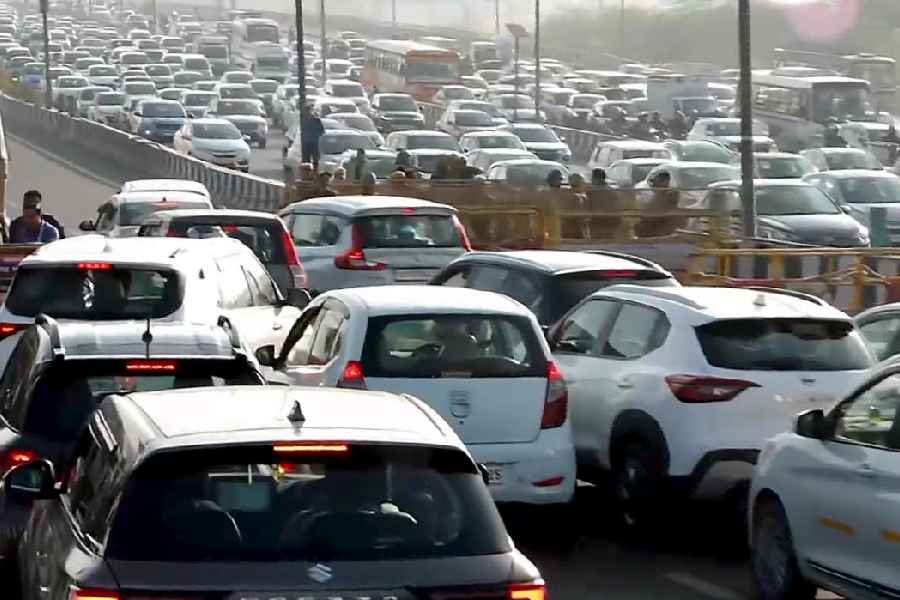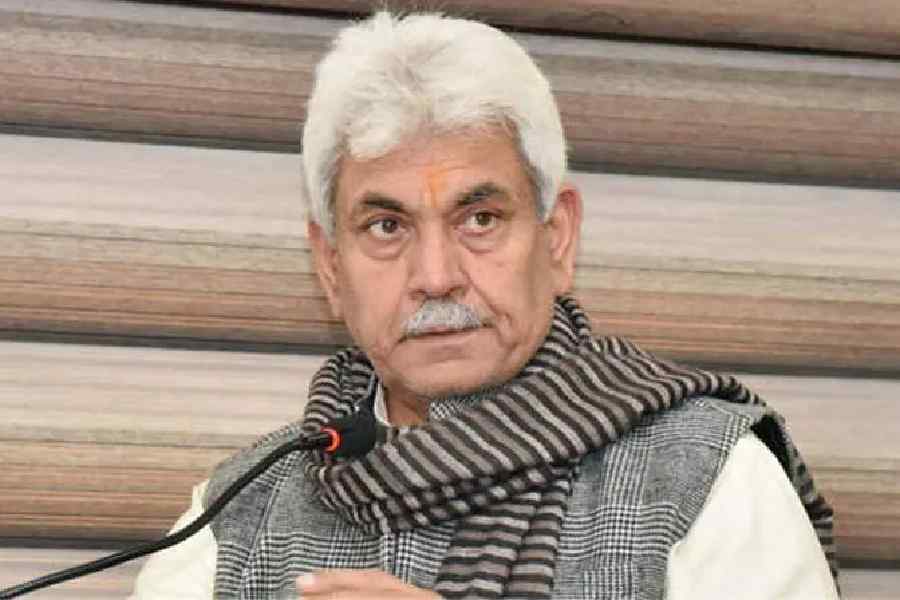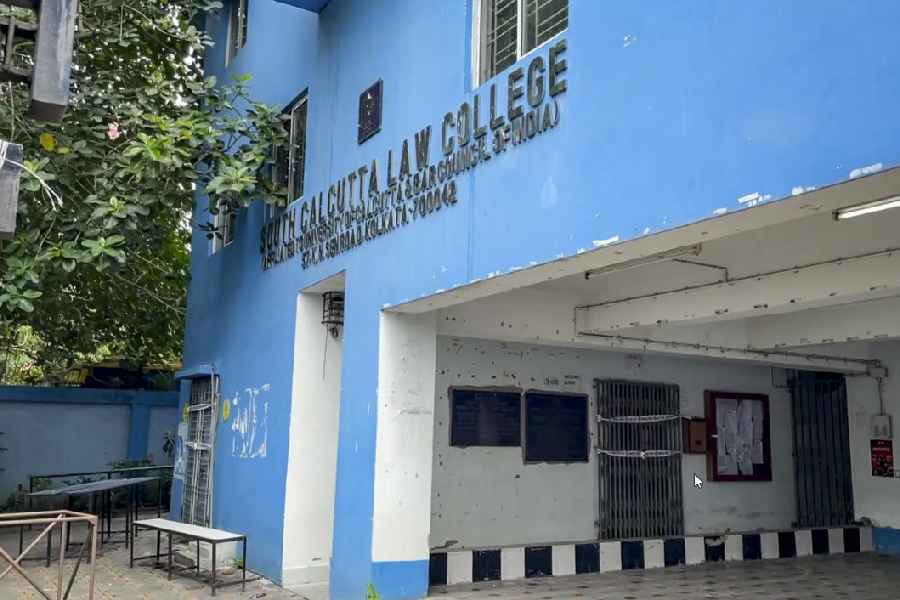 |
| Unpaid employees of the defunct Chanpatia Sugar Mill in Bettiah. Picture by Sankarshan Thakur |
This road changes and it does not change enough. The approach to Bihar’s great outback — forest, frontier, granary, goondom — is massed with the arrangements of impending transformation. Stone-crushers and derricks, earthmovers and rollers, a hectic smokehouse of grit and melted tar, and blackened workmen.
Champaran is about to get closer to the heart of the state than it has ever been before. Coming shortly, an eight-lane motorway that promises to relieve this belt of its remoteness.
In parts, the road running west from Muzaffarpur actually affords flight, but only in bit parts. No sooner have you started to relish the ride than it deposits you in the ditch, dream shoved into a familiar Bihari nightmare: the rutted road.
The milestones to Champaran lie etched with fusty legends of prophets and profiteers, saint and celebrity — George Orwell and Mohandas Gandhi, a succession of Nilha Sahebs (British Indigo planters) and the Millha Sahebs (British Sugarmill owners), and, most recently, filmmaker Prakash Jha, who contested the Bettiah Lok Sabha seat in 2009, lost and promptly repaired to Mumbai to pursue his essential craft; he proved better at Bollywood Rajneeti than rajneeti in Bettiah.
They’ve all arrived here, flashed their fame, or their infamy, and moved on; Champaran has lived in the darkened lee of their departing shadows. Jha descended on this backwoods almost messianic of zeal two years ago — land of my birth, cradle of my childhood, I’ll bring to Champaran what fortune brings to favoured ones. A new hospital ward was erected, a sugar mill with an in-built power plant laid out, a private employment guarantee scheme offered and an elaborate office established on a two-acre plot to put a Rumpelstiltskin spin on Champaran’s penury.
Jha had arrived to turn Champaran’s abundant haystacks into gold.
Came defeat and his ego lay so scalded, his fingers so burnt that he wound up the dream factory overnight. The hospice was dismantled, the sugar mill abandoned and along with it all employment guarantees. His titanic enterprise for Champaran’s lightning leap into the future — an ornate camp HQ crafted by Bollywood set specialists out of latticed bamboo — was put to sleep.
The acreage still stands, bang on the highway a little short of Bettiah, coffined in corrugated sheets, quite dead. Another celebrity nail knocked into Champaran’s disregarded soul.
Bettiah is still coughing the dust raised by the campaign, its mean, flyblown lanes freshly littered with the confetti of new promises from a new set — vote me and you shall have a pot of gold, no less.
Someone’s poked a stick through Rahul Gandhi’s face on a poster just where his cheek sinks and becomes that darling dimple.
Deepika Padukone stands twirled in ecstasy on a massive PVC sheet looming mid-town. Some new cellphone brand. The loveliest ringtones are tinkling down her lips, her midriff lies blackened by the exhaust from a diesel generator chugging away above the clatter of the bazaar. The afternoon is getting on and the place in the throes of daily retail.
The traffic — everything from shining SUVs expressly chartered for the business of elections to ramshackle horsecarts creaking under loads of jaggery and freeloading bees — is stalled.
They’re blaring away to hell, drivers impatient on the pedal blowing flurries of dust as if there wasn’t enough in the air already. The villains of the piece are a bleating herd of goats and kids, stuck mid-road, being spanked on their way to becoming meat. They make a succulent meal, Champaran’s goats, smooth off the bones, silken on the tongue. They say it has something to do with the quality of grass they chew here. Or probably it’s just that they’d rather be slaughtered tender than extend their misery.
Ashok Kumar Pandey, off-loaded tank-keeper of the dead, departed Champaran Sugar Factory, will tell you just how tortuous the drip-drip of living can get in these parts. “Isse to mar jana achha,” he says, “kamse kam aasha nahin karni padegi. (It’s better to die, at least it will save us hoping).”
For nearly a decade now, Pandey and 600-odd mill hands have been pleading and petitioning they be given their rightful farewell wage. “They just sold the factory, shut it and said not so much as a goodbye, where are we to go?”
Pandey and a handful of colleagues — despair wrought deep on their faces — spend their time figuring who to beg next in a darkened corridor of what used to be the factory laboratory. Moss has devoured the walls and powdered the passage with a deathly air. Behind where they sit is an ironic reminder of superannuated glory, a tin plate that reads: “Cawnpore Sugar: Champaran Sugar Factory Ltd, Sutherland House, Cawnpore”. It’s the one thing that has held firm all these years, a block of metal inscribed with what reads like an epitaph. Look closely and it’s actually more nails into more living-dead.
“Remember Morton Toffee?” Mahabir Prasad, former factory tooth-cleaner and Pandey’s mate in misfortune, asks, his shrunken eyes suddenly liquid with nostalgia, “Remember it? We made Morton Toffee, can you believe it? And remember Lal Imli suiting, you may have worn blazers to school, remember? Sutherland House of Cawnpore owned it, our company, our company.” But he looks beyond that tin plate, beyond this catacomb of a corridor to the wild undergrowth on the yard and the wrecked shell of what used to be the pride of Cawnpore Sugar, and he recovers quickly to reality. “Old things, past things,” he mutters apologetically, “useless things.”
And then, as if to give relevance to his pathos, he turns to sardonic anger; Morton Toffee turns to bitter pill. “Tell me, I believe there is a lot of vikas (development) happening all around, is that true? We hear announcements, all the time, this has happened, that has happened, is it true? Look at us, nothing comes our way, nobody comes looking.”
What leads to the crumbling gates of Champaran Sugar Factory is a back-bustee pathway barely even discernible it’s so unused and so obliterated with scrap and scrub.
This road changes and it does not change enough.










